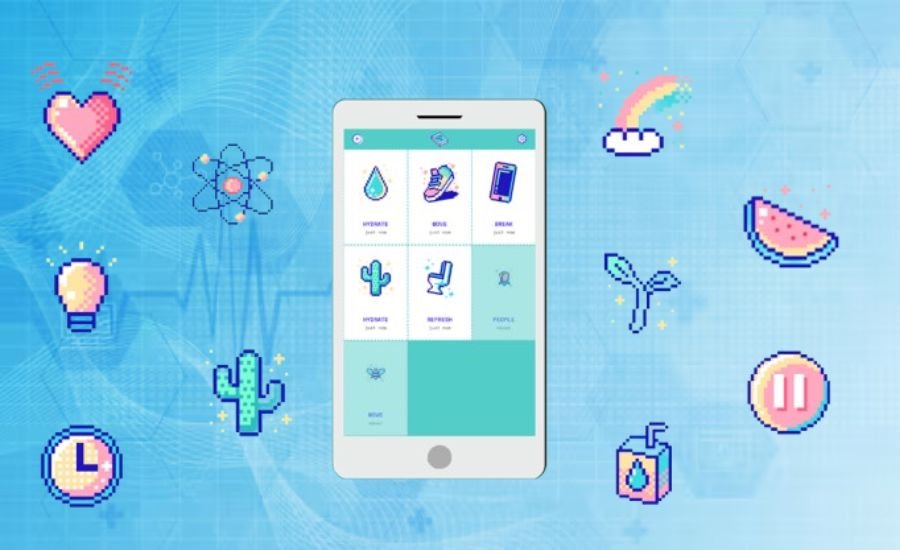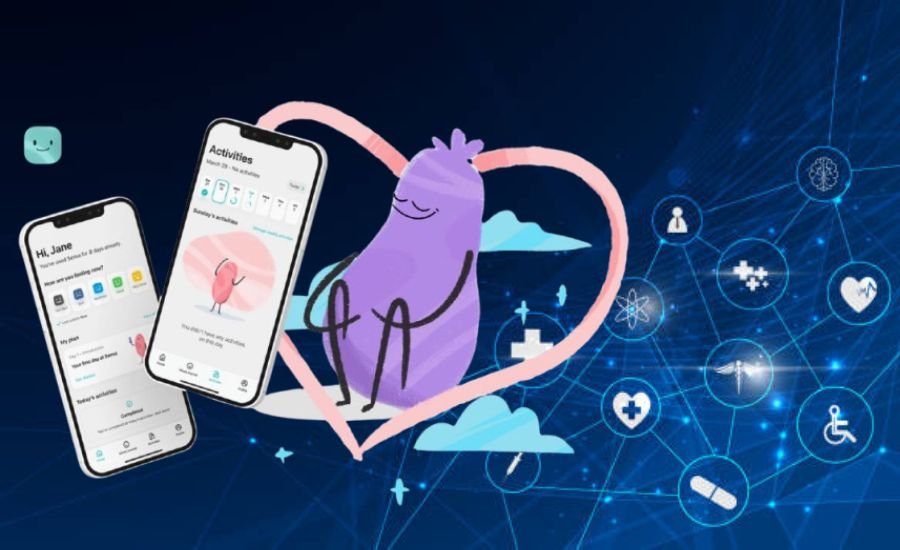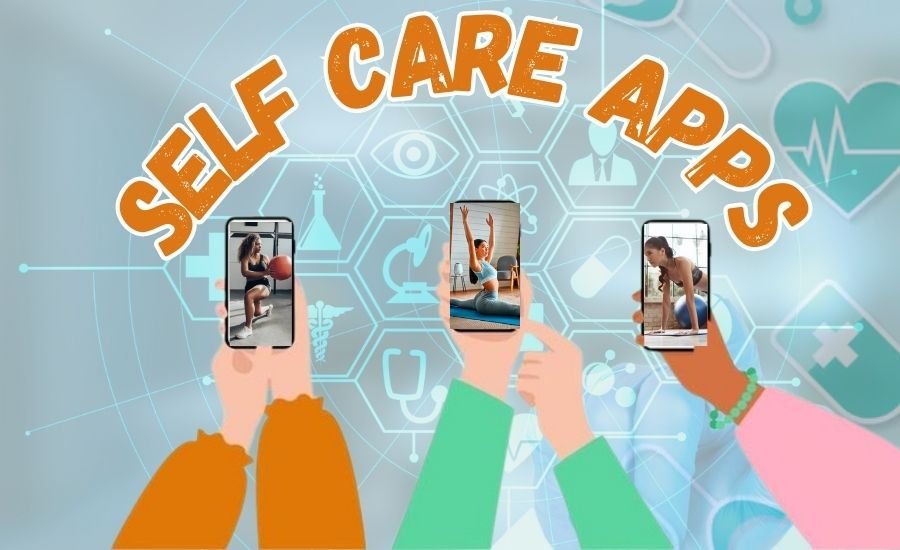Self care apps have simplified finding time for oneself by helping users prioritize their well-being through features ranging from meditation and sleep tracking to fitness tracking and habit formation. Self-care apps have rapidly expanded due to an increasing need for accessible yet cost-effective wellness solutions. People increasingly turn to these self care apps because of their convenience, offering tailored plans specifically for busy lives. Self-care apps provide an essential resource to modern living; with everything needed in one convenient app and new technologies introduced regularly to meet diverse needs, self-care apps have become indispensable resources in leading an active, balanced Life. They are no longer viewed as luxury services but as essential resources.
What Are Self-Care Apps and How Do They Work?
Self care apps are digital platforms created to assist individuals in attaining overall wellness by offering tools and resources to manage mental, emotional, and physical well-being. Many self-care apps specifically address mental well-being via guided meditations, mood trackers, and therapy resources; others target physical well-being via fitness programs, meal planners or activity trackers. Self-care apps owe their success to user-friendly designs that make wellness accessible for users.
Most self care apps enable them to set goals, track progress, and receive tailored recommendations; some even use artificial intelligence (AI) technology to analyze user data and suggest personalized activities. For instance, if you struggle with stress, self-care apps might suggest practising mindfulness exercises or breathing techniques to manage it. They also come with reminders and notifications so you don’t lose track of practising self-care regularly and sustainably. Incorporating wellness into everyday Life means these apps ensure self-care becomes part of everyday living, resulting in sustainable self-care practices over time.
The Incredible Benefits of Using Self-Care Apps

Self care apps provide many advantages that can significantly enhance the quality of Life. First and foremost, these applications make self-care effortless – with just a few taps on your phone, you can access meditation sessions, workout routines or a digital journal for daily journal entries or recording meditation practices or workout regimens. Self-care apps make wellness practices accessible, even during hectic days, as their accessibility means wellness practices will always be within reach. Furthermore, these self care apps solutions offer cost-effective health and wellness solutions compared to in-person therapy or gym membership fees.
| Benefit | Description | Example Features |
| Effortless Accessibility | Self-care apps are easy to use, providing access to wellness tools like meditation sessions, workout routines, or digital journals with just a few taps. | Meditation guides, fitness plans, daily journals |
| Convenience | These apps ensure wellness practices are always within reach, even during busy days, making it easier to maintain consistent self-care routines. | Quick access via mobile devices, customizable reminders |
| Cost-Effectiveness | Self-care apps offer affordable health and wellness solutions compared to the costs of in-person therapy or gym memberships. Many also provide free versions with essential features. | Free plans, lower-cost premium subscriptions |
| Personalization | Apps adapt to individual needs, whether it’s tracking sleep, managing anxiety, or creating healthy habits. | Sleep trackers, anxiety management tools, habit-building modules |
| Accountability | They help users stay consistent with their goals by sending reminders and progress updates to encourage regular engagement. | Daily goal notifications, streak trackers |
| Data Insights | Advanced data tracking features allow users to monitor their progress, providing valuable insights to make informed health decisions. | Analytics on habits, visual progress graphs, tailored health recommendations |
Many self care apps provide free versions with essential features and can even offer personalized versions with crucial features. Another significant benefit is personalization: self-care apps adapt to meet their users’ unique needs, whether tracking sleep cycles, managing anxiety or building better habits. They help stay accountable by reminding users to stick with their goals; furthermore, their data-tracking features provide insight into your progress, empowering informed health decision-making decisions.
Top Self Care Apps You Should Try
Headspace stands out among self care apps with its innovative features and effectiveness, such as mindfulness meditation courses which offer guided sessions for stress reduction and better focus. Calm is an outstanding app to aid sleep with bedtime stories and soothing soundscaping features, while MyFitnessPal is excellent at tracking diet and fitness regimens.
Habitica’s unique gaming approach transforms habit-building into an engaging game for those who appreciate this approach. At the same time, self care apps like Happify use evidence-based activities to increase positivity and reduce stress levels. Each self-care app addresses specific needs, so it should be easy to locate one that aligns with your wellness goals – be that relaxation, fitness, or simply feeling in charge of one’s own Life – there’s bound to be one just right for you.
How to Choose the Best Self-Care Apps for Your Needs
Finding an effective self care apps depends entirely upon your goals and preferences. Once you know exactly what you want to achieve–stress relief, improved sleep patterns, better fitness or emotional well-being–look into apps specializing in these areas. Reading user reviews of self-care apps can provide invaluable insight into their effectiveness and usability.
Many self care apps also offer free trials as a great way to explore all their features before committing to subscription plans. Carefully consider the design and functionality of any app before downloading; an accessible user experience is vitally important for making wellness part of everyday Life. Look out for apps with customizable options like setting personal goals or changing notification preferences. Compatibility with fitness trackers or smartwatches is another primary consideration – and consider which self-care applications best integrate into daily activities to make well-being feel effortless!
Self-Care Apps for Stress Management
Stress can negatively impact mental and physical well-being; self care apps offer practical strategies for combatting it. Headspace and Calm specifically aim to alleviate it through guided meditation techniques designed to reduce tension. These apps feature sessions tailored to stressors like work pressure or personal challenges. Breathwrk offers breathing exercises to soothe both mind and body instantly.
Some self care apps, like Moodpath, go one step further in helping users understand patterns in their emotional states and track triggers that might contribute to stress. With tools to log feelings and track triggers and reminders to take breaks or engage in activities that bring joy, these self-care apps offer tools for proactive stress management that may result in healthier coping mechanisms and lead to a more peaceful, balanced lifestyle.
Improving Sleep with Self Care Apps

Good sleep is integral for overall wellness, and self care apps can assist. Sleep Cycle, for instance, analyzes your sleeping patterns to wake you during the lightest phase of each cycle for maximum rejuvenation and a feeling of renewal. Calm offers bedtime stories, soothing music and meditation sessions designed to help users unwind faster and drift off sooner. Another popular app called Pzizz combines music, voice recordings, and sound effects into personalized sleeping experiences for optimal restful restful restful restful slumber.
Self care apps include sleep trackers that track your behaviours, such as bedtime consistency and screen time before sleep. By analyzing this data, the apps provide actionable tips to enhance rest. They’re especially beneficial to those with insomnia or irregular schedules – using self-care apps regularly could dramatically transform your sleeping patterns while increasing energy levels!
How Self-Care Apps Promote Healthy Habits
| Feature/Benefit | Description | Examples |
| Exciting Habit Formation | Self care apps make forming habits fun and engaging by incorporating gamification and interactive elements. | Habitica (turns tasks into a role-playing game), Streaks (tracks habits with simple tools) |
| Accountability | Apps keep users accountable by sending reminders, tracking milestones, and encouraging regular engagement. | Daily reminders, milestone celebrations |
| Goal Setting | Users can set realistic and achievable goals to avoid feeling overwhelmed, making it easier to stick with routines. | Tools for creating tailored, manageable goals |
| Habit Insights | Self-care apps provide data and insights into habits, helping users identify areas for improvement. | Tracking exercise frequency, monitoring meditation times |
| Visual Progress Tracking | Progress is represented visually, which acts as a motivator for consistency and improvement. | Graphs, streak charts, and progress dashboards |
| Integrated Healthy Routines | These apps make incorporating and maintaining healthy habits a manageable and enjoyable part of daily life. | Customizable routines for fitness, mindfulness, or learning |
Establishing healthy habits has never been simpler with self care apps! Habitica and Streaks make creating new routines exciting and engaging; Habitica even turns goals into an engaging role-playing game where accomplishing tasks earns rewards! On the other hand, Streaks provides you with a tool for tracking progress in particular areas such as fitness, reading or mindfulness. These self-care apps keep you accountable by sending reminders and marking milestones.
Set realistic and achievable goals using self-care apps to avoid feeling overwhelmed. Many apps also provide insights into your habits, helping identify areas for improvement – for instance, tracking exercise frequency or meditation times can serve as an incredible motivator to stay consistent; a visual representation of progress serves as another powerful motivator – so creating and maintaining healthy routines becomes part of daily Life and is fun and manageable thanks to self-care apps!
Conclusion: Empower Your Wellness Journey with Self-Care Apps
Self-care apps are changing how we approach mental, emotional, and physical wellbeing. By offering tailored, accessible, and cost-effective solutions for every aspect of wellbeing – stress relief, better sleep patterns or creating habits – there’s an app designed for every need imaginable – be it managing stress levels, improving sleep or creating better routines – there’s sure to be one suitable for whatever goals or intentions are essential to you! Check out some top self-care apps now and take the first steps towards leading a happier, healthier and happier lifestyle!
Things You Have To: Experiencing-Sushi-Ai-Menu
FAQs About Self-Care Apps
Q: What are self-care apps?
A: Self-care apps are digital tools developed to assist individuals in improving their mental, emotional and physical wellness. Some examples include meditation apps, sleep tracking tools, fitness routine apps or habit-forming tools.
Q: Are self-care apps free to use?
A: Many self-care apps offer free versions with basic features; those offering premium versions with advanced options often require subscription services to access.
Q: How can self-care apps benefit mental health?
A: Self-care apps offer tools like guided meditations, mood trackers and stress management exercises designed to ease anxiety while improving emotional well-being in users.
Q: Can self-care apps track my progress?
A: Absolutely – most self-care apps feature tracking features that monitor habits such as sleep cycles, exercise regimes, or meditation practices to show their development over time.
Q: Which self-care apps provide effective stress relief?
A: Apps like Headspace, Calm and Breathwork provide relaxing techniques such as guided meditations and breathing exercises designed to relieve stress.
Q: Do self-care apps require an internet connection?
A: No internet is required to relax when accessing these applications. Although specific features, like downloading sessions and syncing data, require internet connectivity, many self-care applications work offline after initial setup.
Q: Can self-care apps accommodate novice users?
A: These applications have been created with beginners in mind, with step-by-step guides and user-friendly tools explicitly designed to kick-start wellness journeys.
